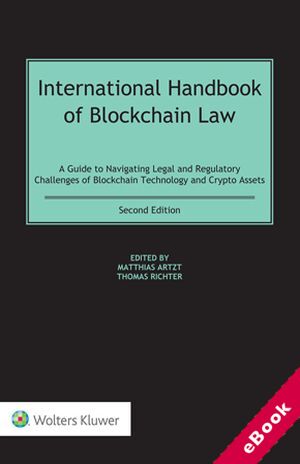We are now closed for the Christmas and New Year period, returning on Monday 5th January 2026. Orders placed during this time will be processed upon our return on 5th January.

The device(s) you use to access the eBook content must be authorized with an Adobe ID before you download the product otherwise it will fail to register correctly.
For further information see https://www.wildy.com/ebook-formats
Once the order is confirmed an automated e-mail will be sent to you to allow you to download the eBook.
All eBooks are supplied firm sale and cannot be returned. If you believe there is a fault with your eBook then contact us on ebooks@wildy.com and we will help in resolving the issue. This does not affect your statutory rights.
NB. This is a revised edition of Handbook of Blockchain Law: A Guide to Understanding and Resolving the Legal Challenges of Blockchain Technology by Matthias Artzt & Thomas Richter.
International Handbook of Blockchain Law, currently in its second edition, is a handbook comprising new chapters and topics but still following the systematic and structured approach of the first edition. Blockchain’s significant advances since 2020 – including many new use cases – have necessitated a comprehensive revision of the first edition of this matchless resource.
What’s in this book:
Each contributor – all of them practitioners experienced with blockchain projects within their respective areas of expertise and specific jurisdictions – elucidates the implications of blockchain technology and related legal issues under such headings as the following:
The foundational chapter on the technical aspects of blockchain technology has been meticulously expanded to elucidate the proof of stake consensus mechanism alongside fresh insights into the ERC-721 Token Standard for non-fungible tokens, decentralized exchanges, staking, stablecoins, and central bank digital currencies.
How this will help you:
As blockchain law cements itself as a distinct legal field, this new edition is invaluable for legal practitioners, in-house lawyers, IT professionals, consultancy firms, blockchain associations, and legal scholars. At a depth that allows non-IT experts to understand the groundwork for legal assessments, the handbook provides those charting the dynamic waters of this field of law with a compass, ensuring they are well-equipped to tackle the legal issues raised by the usage of blockchain technology.